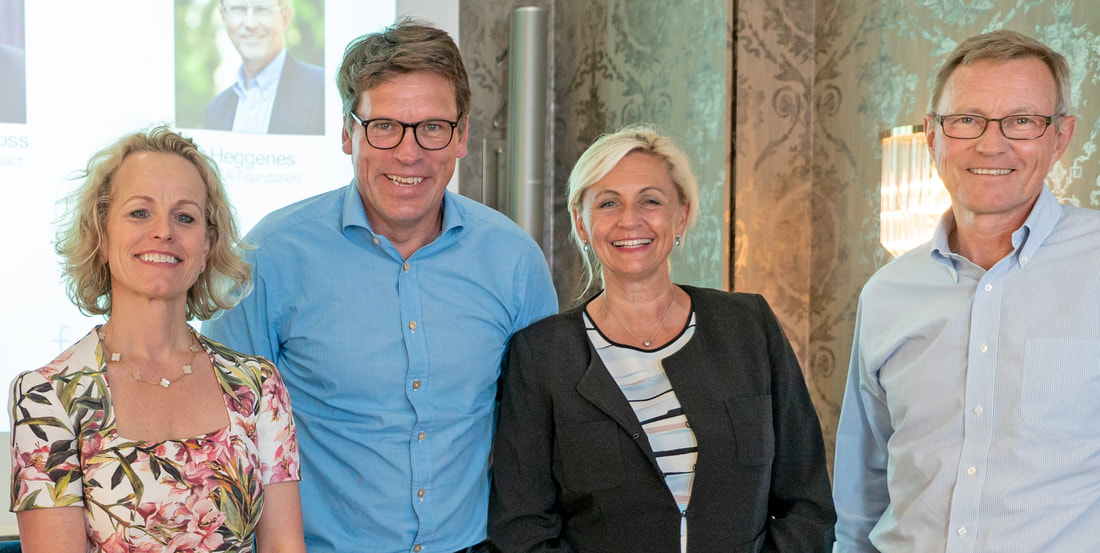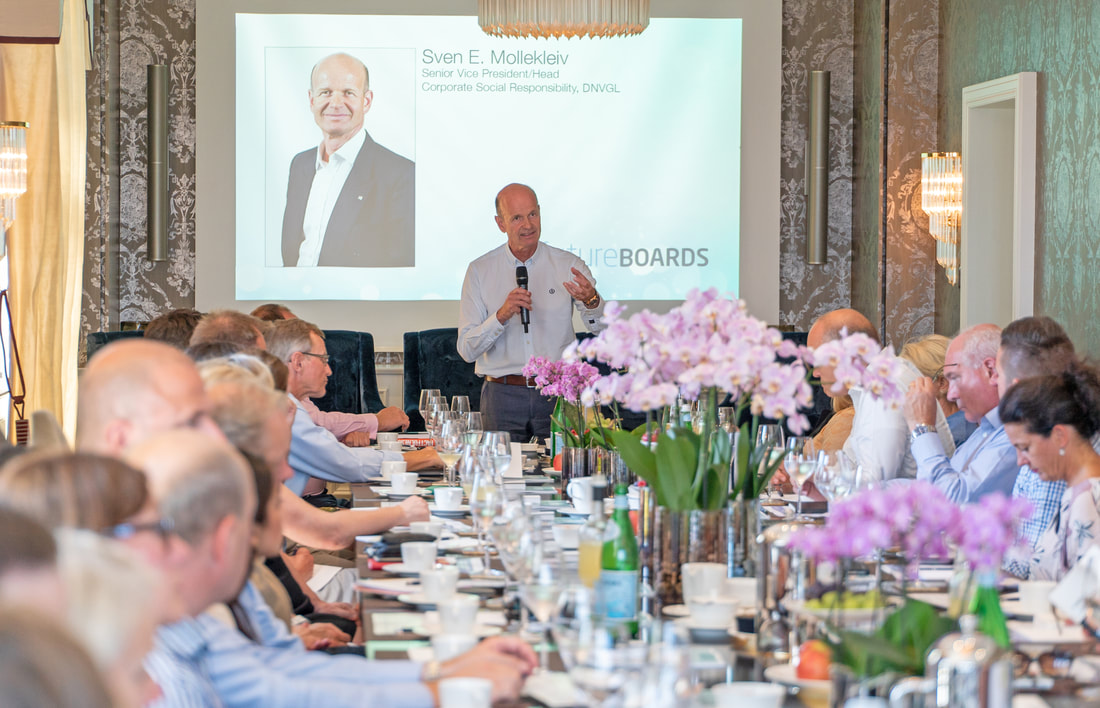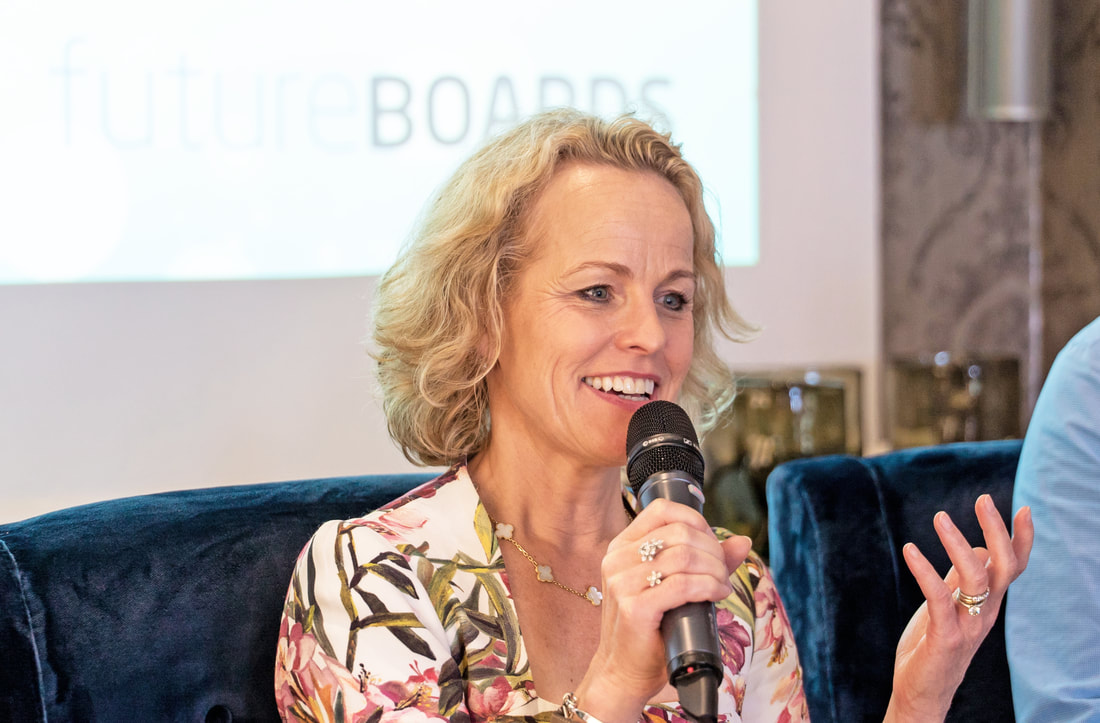|
How can company boards tip the corporate scales towards equitable, sustainable and inclusive leadership? The recent FutureBoards Corporate Governance Summit explored some of the answers. Corporate business is under fire from shareholders, under pressure from legislation and (seemingly) under-engaged with sustainability and the SDGs. However, whereas the credibility of top management has dropped to an all-time low, boards have fared better, retaining the trust of the public to a much higher degree. Consequently, there is an increasing call for boards to step up in promoting equitable, sustainable and inclusive leadership, and in doing so to make their companies “future-fit”. It is this opportunity that the FutureBoards Corporate Governance Summit chose to address at Chitra House in Oslo recently. Sustainability Hub was invited to observe the session on how investors and boards can contribute to achieving the UN Sustainability Development Goals (SDGs). Long-term value creation. The Summit brought together leaders, investors, CEOs, board chairs, politicians, regulators and academics to exchange insights and explore cases and best practices on how business owners and governing bodies can best respond to expectations and scrutiny from stakeholders. The delegates agreed that the scope of the challenges boards face requires changes to both their composition and the way they work. Moreover, they seemed to reflect a wider stakeholder consensus that emerging governance principles, such as purpose, corporate citizenship, responsibility and sustainability, all point to a renewed focus on ensuring long-term value creation. “How and by whom should companies be governed in the future?” Turid Solvang, Founder & CEO of Future Boards, emphasized the importance of arriving at a common understanding of how, and by whom, companies should be governed in the future. Sven Mollekleiv, Senior Vice President and Head of Corporate Social Responsibility at DNV GL, underlined the importance of business addressing this together, defining roles, and turning risks into opportunities. Citing Paul Polman, CEO of consumer goods multinational Unilever, he said that in order to create long-term shared value, boards need to understand how ensuring social prosperity and dignity is good business and how the SDGs can support that work. Chief Corporate Governance Officer Carine Smith Ihenacho explained how Norges Bank Investment Management (NBIM), which invests in 9000 companies across 70 countries, works with boards to encourage focus on long-term value creation. NBIM actively engages in board composition and develops expectation documents on issues such as climate change, human rights and anti-corruption, which are used for dialog with companies and for mapping progress against the SDGs. “Convert words into numbers, and focus on reporting.” Carine urged the delegates to help boards convert words into numbers and to focus on reporting. She suggested that a better reporting framework with meaningful criteria for individual issues is needed, mentioning both the OECD guidelines on corporate governance and the Carbon Disclosure Project’s reporting platform as good examples. Quoting chairman of the international integrated reporting council Professor Mervyn King’s comments about the “plague of short-term capitalism,” Turid Solvang reminded delegates how boards make final judgment calls that affect all of us, and how vital ESG (environmental, social, and governance) reporting is for informing investors of a company's impact on the world. Engaging with the Sustainable Development Goals The delegates also took a close look at how investors and boards can engage with the United Nation’ SDGs. Sustainability, is one of the new perspectives on the purpose of companies that re-define their role in society and pose fundamental questions about the future work of boards. Per Heggenes, CEO of the IKEA Foundation, explained how its vision of a “better everyday life for people” seen through the filter of the SDGs had resulted in a focus on children/youth in crisis in Sub-Saharan Africa. The Foundation now engages with the worst impacts of climate change and population growth by investing in Sub-Saharan Africa, where most population growth will happen. It has also initiated a process with the top seven global climate change NGOs to co-create an agenda for engaging with business and climate change. “Demonstrate the clear alignment between doing good and good profits!” Johann Olav Koss, President, Waratah Impact. President of Right to Play, Johann Olav Koss, now also heads investor fund Waratah Impact, which provides good returns by making “externalities” such as climate change, into internalities/company costs and reducing risk through a fully integrated ESG strategy. He suggests that “green/SDG washing” happens without agreed reporting frameworks and standards and supports hard law obligations, as incentives are not enough. Citing a Goldman Sachs study showing that companies whose ESG policies lack KPIs perform badly, Johann Olav encouraged investors to influence companies by discussion and engagement and to demonstrate the clear alignment between doing good and good profits. Text: Kevin Reeder
2 Comments
naky
17/10/2023 16:36:28
Say goodbye to excess weight and hello to a more vibrant you! This remarkable product helped me drop from 100kg to a lean 65kg. <a href="https://e6eca-w57y83n8e8yp4q5d9rfc.hop.clickbank.net" target="_blank">click here</a> to start your journey towards a healthier lifestyle!
Reply
Leave a Reply. |
WANT TO PUBLISH AN ARTICLE HERE?
Have a read at our Publishing Guidelines: NEWSLETTER
Subscribe to our newsletter to get the sustainability articles sent to you every month. EDITOR
Lauren Guido |
|
Follow Us
Contact Us
|
Want to learn more? |



